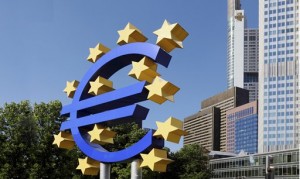by Franklin Templeton Investments blog, Franklin Templeton Investments
As the third-quarter earnings season got into full swing, global equities ground steadily higher last week with no clear macro drivers. In Europe, UK equities outperformed as sterling remained weak. Meanwhile, in the United States, trade headlines on Friday sent US equities up to finish the week higher. Shares in the Asia Pacific region also had a good week in the light of positive trade rhetoric and strong corporate reporting.
The Digest
A Brexit Flextension
 Brexit once again dominated many of the headlines last week as the countdown to the October 31 leave date entered its final week.
Brexit once again dominated many of the headlines last week as the countdown to the October 31 leave date entered its final week.
Early last week, the UK House of Commons approved the second reading of Prime Minister Boris Johnson’s Withdrawal Agreement Bill that would effectively allow the United Kingdom to leave the European Union (EU) with a deal.
However, members of parliament (MPs) rejected the UK government’s proposed short timetable for finalising the bill, effectively meaning there was not enough time to pass the legislation before October 31.
By Friday, the remaining 27 EU countries confirmed they would offer the United Kingdom a further Brexit extension, but they delayed revealing the length of the offered extension to give UK politicians an opportunity to propose ways to resolve the deadlock.
Johnson had proposed a general election, which he wanted to hold on December 12. However, he needs the support of two thirds of MPs. The opposition Labour Party has made it clear that it does not intend to support the election call.
Sterling fell in the immediate aftermath of news that Johnson would be pursuing an election. However, the currency remained elevated from the levels seen less than two weeks ago before Johnson agreed his provisional deal with Brussels.
Early on Monday this week, the EU confirmed it would offer a three-month Brexit delay, taking the new leave date to January 31, 2020. However, the offer includes provisions for the United Kingdom to leave earlier if its parliament passes the Withdrawal Agreement Bill before January. Sterling enjoyed a small rally on the back of that news.
MPs are due to vote on Johnson’s election plan late on Monday. The outcome of that decision is likely to dominate the news agenda for the coming days, in our eyes.
Draghi ECB Tenure Comes to an End
 Last week, Mario Draghi attended his final European Central Bank (ECB) meeting as president. His successor Christine Lagarde takes over at the end of October.
Last week, Mario Draghi attended his final European Central Bank (ECB) meeting as president. His successor Christine Lagarde takes over at the end of October.
No one expected Draghi to rock the boat in his final press conference, and the meeting proved largely a non-event for investors.
The ECB’s wording on the eurozone’s projected gross domestic product (GDP) growth and inflation was identical to its statement after the previous meeting.
Draghi’s press conference comments generally were neutral and as expected. Interestingly, both Draghi and the bank’s official communique avoided discussing the continuously subdued eurozone purchasing manager indices (PMIs) and changes in geopolitical risks. Both of these have been market catalysts of late.
Lagarde’s nomination was announced in July. Many commentators are now keen to see how the former International Monetary Fund (IMF) chair responds to the continuous challenges faced by the ECB.
Lagarde comes from a different background with more of a political focus, so how she interprets market conditions relative to how a seasoned banker like Draghi did should be of interest to analysts.
Only two weeks ago, the IMF itself cut its 2019 global growth forecast to the weakest level in a decade. It blamed global trade tensions, as well as uncertainty around Brexit for the move.
Last Week
Europe
European equities pushed upwards last week, reaching year-to-date highs on Friday. Brexit and corporate earnings news flow dominated market attention.
We also saw a continuation of the rotation from so-called “momentum” names into value stocks.
In terms of sector performance, autos, basic resources and oil & gas names led the way higher. The laggards were food & beverage and telecommunications, which closed the week lower.
There was plenty of European macroeconomic data to digest last week. Of note, we had a negative read for European PMIs, plus eurozone consumer confidence was weaker than expected. In Germany, the manufacturing PMI reading was well into contraction territory.
There were some interesting political developments in Germany over the weekend. Centrist parties lost control of the region of Thuringia as the right-wing AfD party won the largest share of the vote. This continues the trend of the far-right AfD winning support in Eastern Germany, which could impact the political narrative in the country.
Americas
Hopes that the United States and China might be nearing a trade pact propelled US markets higher last week. Rotation into value names helped drive the move following a month-long selloff in bonds. As yields have moved higher, fears of recession have retreated, supporting this dynamic.
Despite some disappointing macro data, the US 10-year Treasury yield moved higher again last week ahead of this week’s Federal Open Market Committee (FOMC) meeting. Markets have almost fully priced in a further interest rate cut.
Despite any concrete progress on trade, sentiment remained positive and equities received a boost on Friday after comments from US Trade Representative Robert Lighthizer suggested the two sides were close to finalising some sections of an interim deal. Trade representatives are currently working to complete a “Phase One” agreement before US President Donald Trump and Chinese President Xi Jinping meet next month in Chile.
It is worth noting that US durable goods orders fell by the most in four months last week, making clear the impact of the ongoing US-China spat on industry. Despite this, signs of hope have been visible in price action of individual stocks.
Crude oil prices saw impressive gains last week amid bullish Department of Energy (DoE) data. Headlines that oil-producing countries will consider more dramatic cuts at OPEC’s December meeting due to a weaker demand outlook in 2020 also offered support.
On the macro front, we saw the US government’s annual budget deficit swell to nearly $1 trillion (the highest in seven years), despite Trump’s pledge to scale back government spending. Lower tax revenues and higher military spending were unsurprisingly the biggest contributors to the figure. The deficit is now expected to surpass the $1 trillion mark in 2020, raising concerns about the sustainability of the debt.
Asia
Focus in Asia was inevitably on the US-China trade talks, and markets were at the mercy of the next headline or tweet on that subject.
Shares in Hong Kong were down slightly on the week with a number of press articles suggesting the Chinese authorities were planning to remove the chief executive of the special administrative region, Carrie Lam.
Earnings were also a focus, in China financial names outperformed. Elsewhere in China, attention focused on the Central Committee of the Communist Party of China’s (CPC) Fourth Plenary Session to be held this week. Delegates will discuss China’s future economic policy.
Week Ahead
It’s shaping up to be a busy week for earnings in both Europe and the United States, with releases likely to drive stock moves. Brexit and trade will likely dominate headlines, and the week’s big monetary policy event will be the US Federal Open Market Committee meeting on Wednesday.
Economic Data
- United States: The big release will be the monthly employment report on Friday. Consumer confidence figures are due out on Tuesday.
- Europe: Euro-area GDP and inflation data will be in focus on Thursday. German inflation and employment data on Wednesday will be high on the agenda given recession fears. UK consumer confidence should be interesting on Thursday, as will manufacturing PMI on Friday in the context of Brexit.
Monetary Policy:
- FOMC Wednesday.
- Bank of Japan rate decision on Thursday.
- The ECB implements its tiering system on Wednesday.
Views You Can Use
Insight from Our Investment Professionals
Malaysia’s 2020 Budget: A Delicate Balancing Act
Malaysia’s newly unveiled 2020 budget displays a commitment to sustainable long-term growth, according to Sukumar Rajah and Hanifah Hashim. Here, they suggest how the country’s foreign investment, transport and employment initiatives could drive the domestic economy. Read More.
Exchange-traded funds (ETFs) are no longer the preserve of investors who are solely focused on passive vehicles. Recent years have seen ETFs evolve in sophisticated ways to address developing investor needs. In this article, Jason Xavier, Head of EMEA ETF Capital Markets, examines “active” ETFs, and answers some common questions about them that he hears from investors. Read More.
Templeton Global Macro: An Update on our ESG Scores
Templeton Global Macro evaluates environmental, social and governance (ESG) factors in its macroeconomic research process and describes the process of codifying the team’s research discussions into quantifiable scores. Read More.
Three Tenets for Investing in Innovation
With global economic growth experiencing a slowdown this year, some investors may be concerned about valuations for the innovative companies that have been popular during the past decade. Against this backdrop, Franklin Equity Group’s Matt Moberg explains why he thinks select companies have the potential to grow faster than the overall market in the next decade and beyond. He also shares his team’s three guiding principles for investing in these companies. Read More.
For timely investing tidbits, follow us on Twitter @FTI_Global and on LinkedIn.
Important Legal Information
This article reflects the analysis and opinions of Franklin Templeton’s European Trading Desk as of 21 October 2019, and may vary from the analysis and opinions of other investment teams, platforms, portfolio managers or strategies at Franklin Templeton. Because market and economic conditions are often subject to rapid change, the analysis and opinions provided may change without notice. An assessment of a particular country, market, region, security, investment or strategy is not intended as an investment recommendation, nor does it constitute investment advice. Statements of fact are from sources considered reliable, but no representation or warranty is made as to their completeness or accuracy. This article does not provide a complete analysis of every material fact regarding any country, region, market, industry or security.
Nothing in this document may be relied upon as investment advice or an investment recommendation.The companies named herein are used solely for illustrative purposes; any investment may or may not be currently held by any portfolio advised by Franklin Templeton.
Data from third-party sources may have been used in the preparation of this material and Franklin Templeton (“FT”) has not independently verified, validated or audited such data. FT accepts no liability whatsoever for any loss arising from use of this information and reliance upon the comments, opinions and analyses in the material is at the sole discretion of the user. Products, services and information may not be available in all jurisdictions and are offered by FT affiliates and/or their distributors as local laws and regulations permit. Please consult your own professional adviser for further information on availability of products and services in your jurisdiction.
What Are the Risks?
All investments involve risk, including possible loss of principal. The value of investments can go down as well as up, and investors may not get back the full amount invested. Stock prices fluctuate, sometimes rapidly and dramatically, due to factors affecting individual companies, particular industries or sectors, or general market conditions. Bond prices generally move in the opposite direction of interest rates. Thus, as prices of bonds in an investment portfolio adjust to a rise in interest rates, the value of the portfolio may decline. Investments in foreign securities involve special risks including currency fluctuations, economic instability and political developments. Investments in developing markets involve heightened risks related to the same factors, in addition to those associated with their relatively small size and lesser liquidity.
Past performance is not an indicator or guarantee of future performance.
Links to External Sites
Franklin Templeton Investments is not responsible for the content of external websites.
The inclusion of a link to an external website should not be understood to be an endorsement of that website or the site’s owners (or their products/services).
Links can take you to third-party sites/media with information and services not reviewed or endorsed by us. We urge you to review the privacy, security, terms of use, and other policies of each site you visit as we have no control over, and assume no responsibility or liability for them.
__________________
This post was first published at the official blog of Franklin Templeton Investments.














